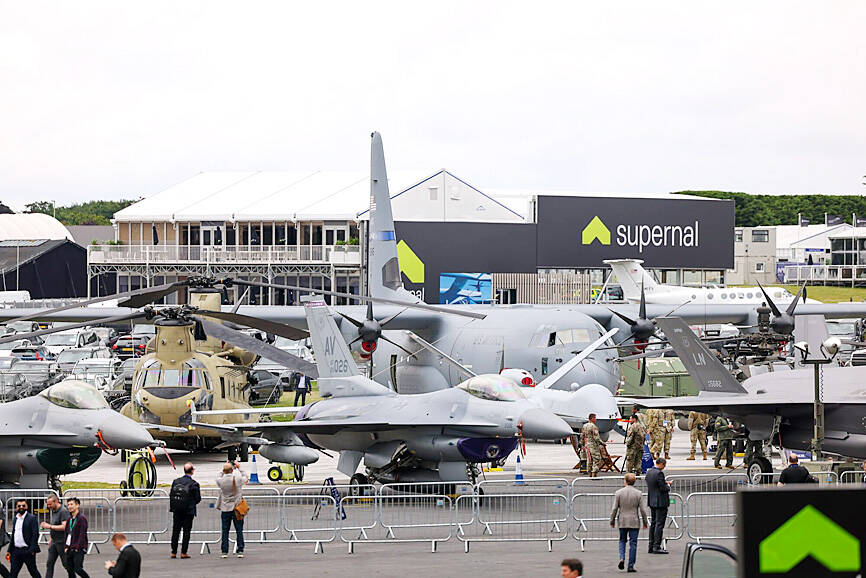Aerospace Industrial Development Corp (AIDC, 漢翔航空工業) has signed memorandums of understanding (MOU) with foreign companies to collaborate on technologies related to tanks, warplanes and drones, the company said in a statement yesterday.
Last week, AIDC chairman Hu Kai-hung (胡開宏) and AIDC personnel visited the UK and signed the MOUs while attending the biannual Farnborough International Airshow.
The MOUs include an agreement to collaborate on military technologies for reconnaissance, defense and attack, are expected to enhance AIDC’s technology and provide complete support for the armed forces, he said.

Photo: Bloomberg
The nation’s ability to defend itself independently stems from its local military capability, Hu said, adding that AIDC would spare no effort boosting Taiwan’s independent defense capabilities.
AIDC took the first step by allying with a European aviation giant to jointly innovate drone countermeasures, as drone technology is developing rapidly worldwide.
Combining its high-quality techniques in avionics and system integration with the European company’s counter-uncrewed aircraft systems, AIDC could quickly tap into the drone market at home and abroad, while incorporating the domestic aerospace supply chain in Taiwan to develop defense devices for detection and interference that would meet different client needs.
Next, AIDC collaborated with a major US defense contractor on the upgrade of the M60 Main Battle Tank, and maintenance of 600-gallon fuel tanks, in line with the armed force’s project to upgrade 460 M60A3 Tanks.
The US defense contractor, having assisted many countries in upgrading more than 1,000 M60A3 Tanks, would transfer technology to AIDC and help develop its maintenance abilities, AIDC said, adding that it would draw on its successful experiences from its F-16 Maintenance Center, AIDC said.
The US company also licensed AIDC to maintain and repair the 600-gallon wing fuel tanks for F-16 fighter jets, helping to expand the servicing scope of the F-16 Maintenance Center, AIDC said.
As AIDC improved the performance of 140 serving F-16A/B fighters last year in line with the government’s Project Soaring Phoenix (鳳翔專案), and having purchased more than 60 F-16V Block 70 fighters from the US Air Force, Taiwan would soon have a fleet of more than 200 F-16V fighter jets — the largest air fleet in Asia.
Having been the primary contractor of the F-16 Maintenance Center and accumulating considerable logistics and maintenance experience locally in Taiwan, AIDC would develop maintenance abilities in collaboration with the US company to provide immediate services for the air force, AICD said.
Meanwhile, AIDC has also signed a deal with the US aviation system manufacturer that produces the Joint Helmet Mounted Cueing System (JHMCS), which is an advanced aviation device that helps pilots track and target enemy fighters.
The US company could offer fast delivery and competitive prices via commercial sales to promote the JHMCS business jointly with AIDC, while also providing technical support for AIDC to help maintain and repair the JHMCS.
By equipping F-16V fighter jets with the JHMCS, AIDC aims to directly boost the air force’s military strength, the statement said.

Taiwanese can file complaints with the Tourism Administration to report travel agencies if their activities caused termination of a person’s citizenship, Mainland Affairs Council Minister Chiu Chui-cheng (邱垂正) said yesterday, after a podcaster highlighted a case in which a person’s citizenship was canceled for receiving a single-use Chinese passport to enter Russia. The council is aware of incidents in which people who signed up through Chinese travel agencies for tours of Russia were told they could obtain Russian visas and fast-track border clearance, Chiu told reporters on the sidelines of an event in Taipei. However, the travel agencies actually applied

Japanese footwear brand Onitsuka Tiger today issued a public apology and said it has suspended an employee amid allegations that the staff member discriminated against a Vietnamese customer at its Taipei 101 store. Posting on the social media platform Threads yesterday, a user said that an employee at the store said that “those shoes are very expensive” when her friend, who is a migrant worker from Vietnam, asked for assistance. The employee then ignored her until she asked again, to which she replied: "We don't have a size 37." The post had amassed nearly 26,000 likes and 916 comments as of this

New measures aimed at making Taiwan more attractive to foreign professionals came into effect this month, the National Development Council said yesterday. Among the changes, international students at Taiwanese universities would be able to work in Taiwan without a work permit in the two years after they graduate, explainer materials provided by the council said. In addition, foreign nationals who graduated from one of the world’s top 200 universities within the past five years can also apply for a two-year open work permit. Previously, those graduates would have needed to apply for a work permit using point-based criteria or have a Taiwanese company

The Shilin District Prosecutors’ Office yesterday indicted two Taiwanese and issued a wanted notice for Pete Liu (劉作虎), founder of Shenzhen-based smartphone manufacturer OnePlus Technology Co (萬普拉斯科技), for allegedly contravening the Act Governing Relations Between the People of the Taiwan Area and the Mainland Area (臺灣地區與大陸地區人民關係條例) by poaching 70 engineers in Taiwan. Liu allegedly traveled to Taiwan at the end of 2014 and met with a Taiwanese man surnamed Lin (林) to discuss establishing a mobile software research and development (R&D) team in Taiwan, prosecutors said. Without approval from the government, Lin, following Liu’s instructions, recruited more than 70 software